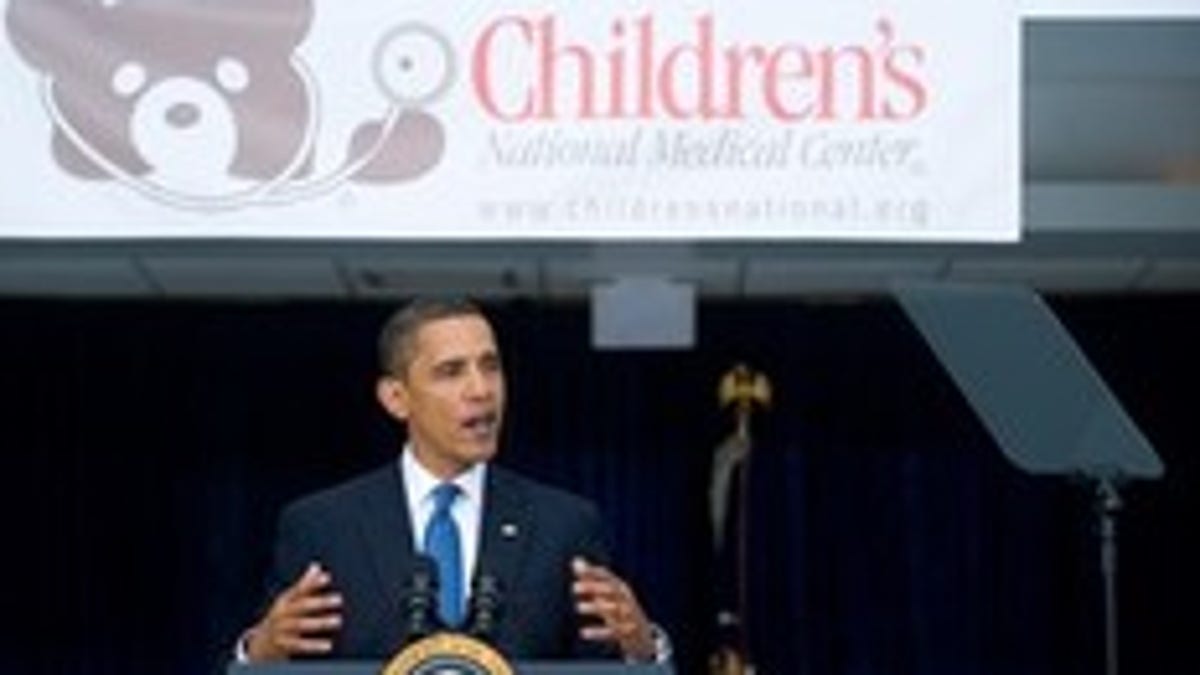
US President Barack Obama speaks on healthcare during a visit to the Children's National Medical Center in Washington on July 20, 2009. AFP PHOTO/Saul LOEB (Photo credit should read SAUL LOEB/AFP/Getty Images)
When President Obama decided to make health-care reform his number one domestic priority, he did so knowing that one critical element of this decades-long debate has changed; namely that we are in the midst of the worst economic recession and job market since the Great Depression.
Unfortunately, the critical issues of health-care R&D, job creation and the need for pro-growth strategies as a prerequisite to generating revenue, combating rising sector inflation and contributing to America's economic recovery have largely gone unaddressed. Instead, the administration's focus is on what role, if any, the federal government should play in insuring Americans without coverage. House Democrats introduced legislation with an unprecedented $1.5 trillion price tag last week including a "public option" to compete with private plans, paid for by taxing wealthy Americans and imposing penalties on small businesses with payrolls of $250,000 or higher that don't provide health insurance to their employees.
Douglas Elmendorf, director of the non-partisan Congressional Budget Office, said about draft legislation, "We do not see the sort of fundamental changes that would be necessary to reduce the trajectory of federal health spending by a significant amount. And on the contrary, the legislation significantly expands the federal responsibility for health care costs."
When combined with crippling job forecasts, the stakes couldn't be higher. Without a bi-partisan compromise, he risks a political and economic catastrophe that will threaten his larger domestic agenda and drive away the very investment communities that fund life-saving innovations and treatments.
President Obama needs to bring all sides together by prioritizing three equally important objectives:
First, making economic growth the centerpiece of a bi-partisan reform package. Unfortunately, Democrats are giving the impression that quantity supersedes quality. By contrast, they could score points on the economy, alleviate growing fears over "government-run health care" and help solidify a bi-partisan compromise by tabling the radioactive options - higher taxes, cuts to Medicare, etc. -that will only exacerbate our nation's already precarious economic situation. As President Obama made clear in his speech earlier this year to the American Medical Association, "this is a test of whether we -Democrats and Republicans alike - are serious about holding the line on new spending and restoring fiscal discipline."
Second, encouraging private capital investment that will not only drive growth, but help cut costs, restore fiscal discipline and fight chronic diseases. Representative Rangel's (D-New York) idea of increasing taxes during a period of economic softness is a job-killing strategy; instead, we need incentives that give businesses the confidence necessary to both create jobs and invest in next-generation drugs.
Case in point is the debate over establishing an approval pathway for follow-on biologics, the generic version of drugs developed biologically. Policymakers remain divided over the period of data exclusivity during which a follow-on patent applicant could not rely on the innovator's data for approval. The White House, now at odds with Senator Edward Kennedy (D-Mass.), favors a seven-year period. Kennedy recently helped push through a 12-year exclusivity period in the Senate Health Committee, consistent with what many economists believe is not only the minimum necessary to help innovators capture a sufficient return, but will encourage long-term investment in a sector that contributed $88.5 billion to the gross domestic product (GDP) in 2006 alone. A seven-year time period, economists contend, will only dry up investment at a time when it is badly needed.
Third, proposing new policies that take the focus off of public vs. private and prioritize small businesses. The notion of giving small business owners a much-needed payroll tax holiday and providing other meaningful incentives to help them achieve the ultimate goal of covering more Americans has surprisingly taken a backseat role. So has the need to bring our nation's health-care system into the 21st Century through greater investment in information technology, arguably one of the most non-partisan and pro-growth elements of the health-care debate.
Even a bi-partisan idea put forth by former Senate Majority Leaders Tom Daschle, Howard Baker and Bob Dole that would create state and regional health insurance exchanges, which have the potential to give individuals and small business owners greater purchasing power, has been pushed to the back of the shelf.
"If you want to stop this thing dead in its tracks, or dead on arrival, in my view you put the public plan in it," Dole said in announcing the idea.
We shouldn't have to make a Hobson's choice. While Congress may decide to raise taxes to increase the number of insured Americans, without a pro-growth agreement it will ultimately fail all of our citizens by further adding to our nation's unemployment woes and eroding the high quality of medical care necessary to ensure that we create jobs and remain competitive in the global marketplace. Stated simply, Democrats and moderate Republicans running for re-election next year cannot afford to accomplish anything less.
Douglas E. Schoen, a pollster and writer, has been a campaign consultant for more than 30 years and is the author of Declaring Independence: The Beginning of the End of the Two-Party System.
